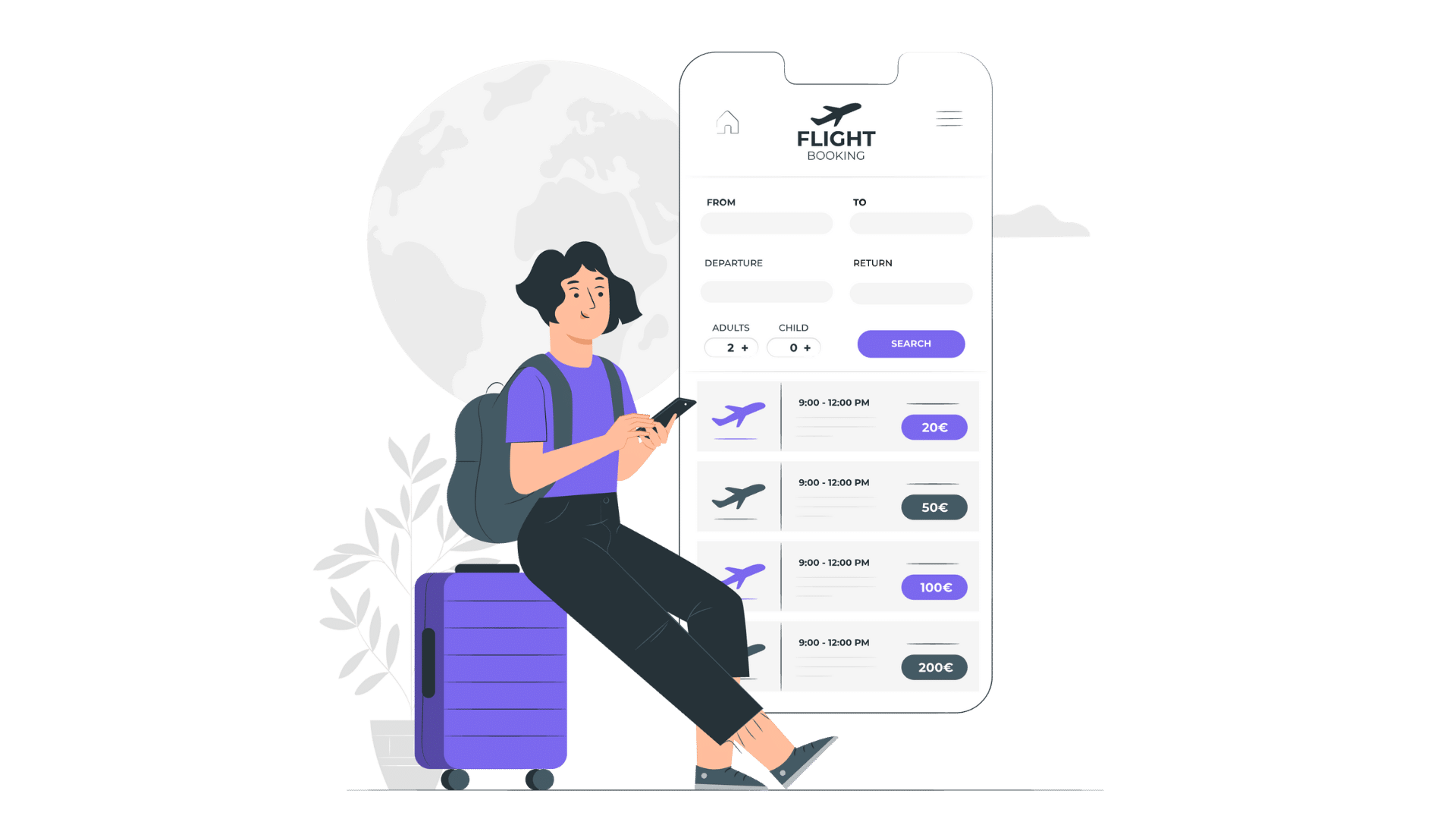
Let’s be honest — managing business travel without a proper system just doesn’t cut it anymore. Bookings get scattered across different platforms, employees forget to follow policies and expense management turns into a never-ending paper trail. It’s a constant struggle to keep everything in check, and one mistake can lead to unnecessary headaches and additional costs.
That’s where a travel management system (TMS) takes the stress out of the process. It helps centralise everything — flights, hotels, approvals, expenses — so you don’t have to juggle between multiple tools or chase employees for receipts.
So, before we get into the features or why it is a must-have for businesses today? Let’s first see what exactly a travel management system is.
A travel management system helps businesses plan, book and manage all of their corporate travel in one place. This way, you are saved from the trouble of manually finding scattered emails, lost receipts or out-of-policy bookings — everything is organised and automated for a smoother experience.
With a TMS, your employees can book trips within company policies, managers can approve requests instantly and finance teams can track expenses in real time. This helps cut down costs, saves time and makes travel hassle-free for every business. Whether your company handles occasional trips or has much more frequent travelling, a TMS ensures everything runs smoothly.
Rising costs, stricter compliance rules and the need for real-time tracking mean companies can no longer afford to manage travel manually. Maintaining data in spreadsheets, sending emails for approvals and endless back-and-forth conversations only slow things down and increase the chances of costly mistakes.
In 2025, businesses need a smarter, more efficient, automated solution — and that’s exactly what a TMS provides. Let’s see its key features that help you streamline your travel operations.
One of the biggest challenges a business faces is managing travel while controlling costs and ensuring employees have comfortable, safe and convenient trips. Without a system in place, overspending on last-minute bookings or out-of-policy hotels is common.
A travel management software helps you:
✔ Find cost-effective flights and hotels within your travel policy
✔ Prevent overspending with pre-approved bookings
✔ Get access to corporate discounts and negotiated rates
✔ Track expenses in real time and stop unnecessary spending
With automated approvals and built-in budget controls, a TMS ensures you get the best value for every travel expense.
Manually booking flights, collecting receipts and chasing approvals is a massive waste of time. Your employees get frustrated, the finance team struggle with paperwork and managers end up approving expenses they can’t even track properly.
With a TMS, you can:
✔ Automate travel approvals, bookings and reimbursements
✔ Eliminate paperwork with digital receipts and real-time tracking
✔ Get instant expense reports instead of waiting for employees to submit them
A TMS lets your team focus on more important work instead of getting stuck in admin tasks by streamlining the entire process.
Without travel management software, enforcing your travel policies is nearly impossible. Employees often book expensive flights or hotels simply because they don’t know the rules — or worse, some might take advantage of the system.
A TMS helps your business by:
✔ Enforcing travel policies automatically — no more out-of-policy bookings
✔ Setting spending limits and approval workflows to keep expenses in check
✔ Identifying suspicious claims or duplicate expenses before they get reimbursed
With automated compliance checks, you can be sure every travel expense is within company policy, saving your business from unnecessary losses.
Your employees traveling for business trips should have a smooth and stress-free experience. They shouldn’t be bothered with spending hours finding flights, worrying about reimbursements or struggling with approvals.
A TMS makes travel easier by:
✔ Providing pre-approved travel options to choose from
✔ Giving employees real-time travel updates and alerts
✔ Allowing quick reimbursements without paperwork
With a system that handles the details, employees can focus on work instead of worrying about travel logistics.
Do you know how much your company really spends on business travel? Many businesses struggle to get clear insights, leading to overspending, budget leaks and inefficiencies.
You get:
✔ Real-time dashboards to track travel expenses
✔ Detailed reports on travel trends, spending patterns and policy compliance
✔ Forecasting tools to help your business budget smarter
With complete visibility, you can analyse travel expenses, optimise budgets and make smarter financial decisions.
Now that you understand why travel management software is essential, the next step is choosing the right software for your business. With so many options available and a growing travel industry, it’s important to find the one that best fits your needs, integrates seamlessly with your current operations and enhances efficiency without adding complexity.
Here are the key factors to consider when selecting a TMS:
Your travel needs today may not be the same a year from now. Whether your company sends employees on occasional trips or has frequent corporate travel management, the TMS should be able to scale accordingly.
Can it handle different travel volumes (small teams vs. large enterprises)?
Does it allow policy customisation based on employee levels or travel frequency?
Can it adapt to international travel requirements (multi-currency, visa support, compliance regulations)?
With a scalable and flexible TMS, you can ensure that your travel management remains smooth and efficient as your business grows.
The main purpose of getting a TMS is to simplify travel management, not make it more complicated. A complex or difficult-to-use system will lead to frustration and low adoption rates.
Is the interface clean and intuitive? Employees should be able to book travel quickly without extra training.
Are approvals and expense submissions easy for managers and finance teams?
Does it have a mobile app? Employees should be able to manage bookings and approvals on the go.
A user-friendly TMS ensures that everyone—from employees to finance teams—can use it effortlessly, saving time and reducing errors.
A TMS should seamlessly connect with the tools your company already use, so you don’t have to switch between platforms manually.
Does it integrate with accounting software (e.g., QuickBooks, SAP)?
Can it sync with HR & payroll systems for automatic expense processing?
Does it connect with major booking platforms (airlines, hotels, car rentals)?
A well-integrated TMS ensures that all travel-related data flows smoothly across different departments, reducing manual work and improving accuracy.
Your TMS should do more than just process bookings — it should give real-time visibility into travel spending and trends.
Does it offer real-time dashboards to track travel expenses?
Can it generate detailed reports on spending trends, policy compliance and savings?
Does it provide forecasting tools to optimise travel budgets?
With insights that are accurate and quick, you can make smarter financial decisions and continually refine your travel policies for better efficiency.
A TMS handles sensitive company data, employee information and financial records, so security and support should be top priorities.
Does it have strong data protection measures (encryption, secure access, GDPR compliance)?
Is 24/7 customer support available in case of travel issues or system failures?
Does it provide employee tracking & safety features for duty-of-care compliance?
A secure and well-supported TMS gives businesses peace of mind, knowing their data is safe and help is available whenever needed.
Now that you have a clear understanding of what a TMS is and how it helps your business. You should immediately start looking for one, because, why not? It saves money and time, ensures compliance and gives you full control over your company’s travel operations.
If you are looking for a TMS and want to see how it can transform your travel business? Let me give you a suggestion of starting with Telecrm (India’s best travel CRM), book a demo and experience first hand how it can make your business travel more streamlined and efficient.


© Copyright 2025 Telecrm.in - All Rights Reserved • Privacy Policy • T&C


© Copyright 2025 Telecrm.in - All Rights Reserved • Privacy Policy • T&C